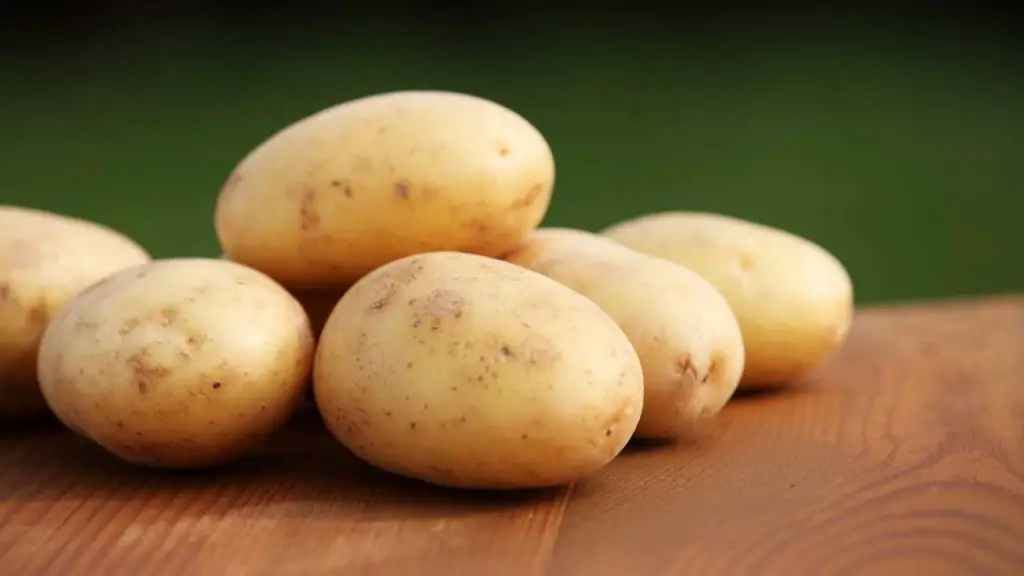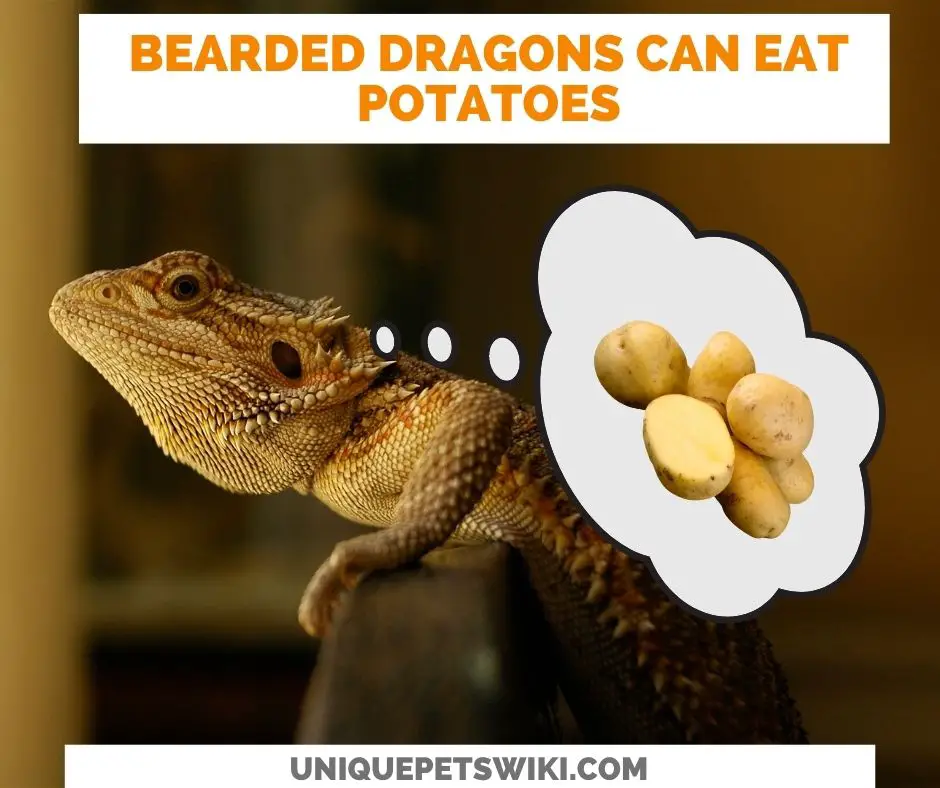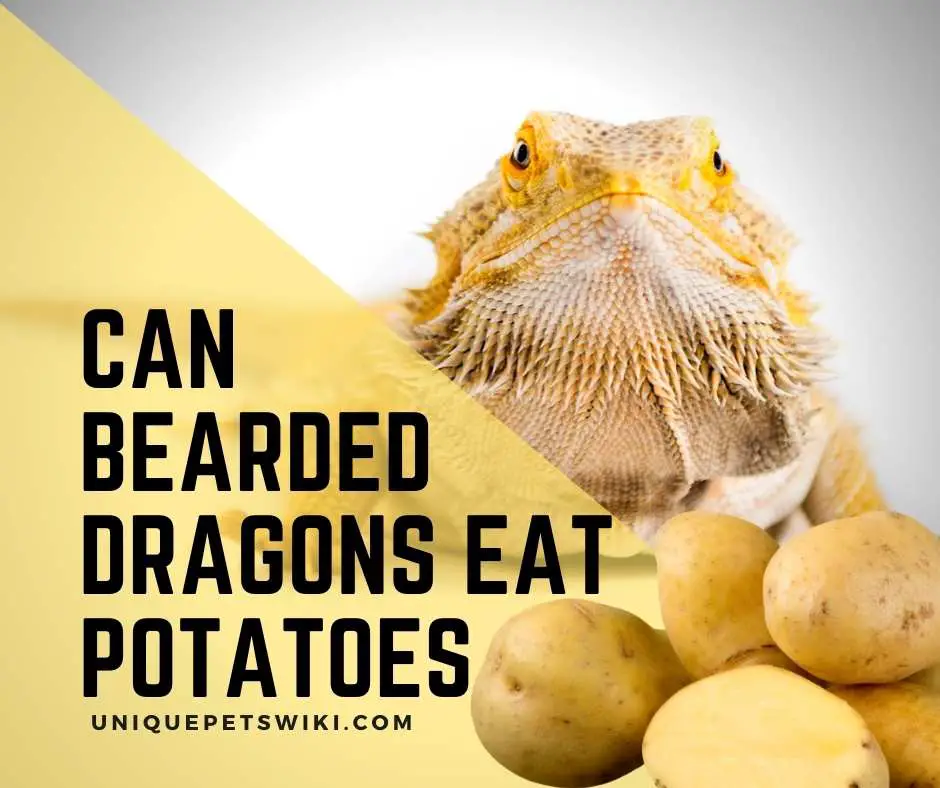You will always hear about dandelion greens, turnip, kales, broccoli, etc. as good option foods for bearded dragons. But people rarely talk about potatoes. Can bearded dragons eat potatoes?
It is the responsibility of every dragon owner to have a list of foods that the beardies can and cannot eat. In most cases, bearded dragons are not picky eaters and will eat anything they find resembling food.
We need to explore potatoes and see if you can include them in the list of foods that you should be feeding your dearest dragon. Keep reading for more information.
This article has been reviewed by Dr. Dilber. Read more about our knowledge control process here.
Contents
What are the Nutrients Found in Potatoes?

The data below will tell us if it is okay to feed potatoes to bearded dragons after considering their nutritional value.
| Nutrients | Amount/100g | Unit |
| Water | 79.25 | g |
| Protein | 2.05 | g |
| Energy | 77 | kcal |
| Fiber | 2.1 | g |
| Sugar | 0.82 | g |
| Carbohydrates | 17.5 | g |
| Starch | 15.3 | g |
| Calcium | 12 | mg |
| Phosphorus | 57 | mg |
| Vitamin C | 19.7 | mg |
| Ca:P | 1:4.8 | – |
These are only the most relevant nutrients in potatoes, flesh, and skin. The data is from the USDA Nutritional Database.
From the table, you can see that potatoes contain a lot more phosphorus than calcium, and they are high in starch and carbohydrates.
The water content is ideal for hydration, and also these veggies have a decent amount of vitamin C and fiber.
Can Bearded Dragons Eat Potatoes?

Bearded dragons can eat potatoes but on infrequent occasions, and you should feed only a little bit of them. Although potatoes don’t have a high nutritional value, the beardies can benefit from a couple of nutrients.
For instance, potatoes are excellent sources of water, which is essential in the beardies for hydration.
Bearded dragons aren’t fond of drinking water, but their primary hydration source is food, bathing, or misting. So, feeding potatoes is an excellent way to provide water.
Apart from that, potatoes are slightly high in fiber, supporting smooth digestion and aids in bowel movement. However, raw potatoes aren’t ideal for the beardies, which requires you to cook them before feeding.
Remember, bearded dragons eat raw foods in the wild, and the same should happen in captivity. That’s why I recommend you to offer potatoes to your lizard on pretty rare occasions. But it is healthy if you choose to avoid feeding them.
How Often Can Bearded Dragons Eat Potatoes?
Potatoes are useful if you provide them here and there around once or twice a month or less frequently.
Potatoes are incredibly rich in phosphorus, and in large doses, this can be harmful to bearded dragons. We all know that when there’s too much phosphorus in the diet, it tends to block calcium absorption by binding to it.
That is the reason why foods that are high in phosphorus are, in most cases, discouraged for bearded dragons, or you feed them less frequently in pretty little amounts.
You might also want to keep potatoes off from your beardie’s diet because of its low calcium content. As far as bearded dragons go, calcium is a vital mineral, and they need sufficient of it for good health and well-being.
Also, cooking makes potatoes unideal foods to be used regularly for bearded dragons. If you didn’t know, cooking loses some of the essential nutrients, and therefore, cooked foods provide only a few nutrients.
What are Other Foods that You Can Feed Your Bearded Dragon Instead of Potatoes?
Sometimes you may feel it is not helpful to feed potatoes to bearded dragons due to its nutritional aspect, which calls for the need to look for safe foods. The idea of being safer than sorry also applies when it comes to caring for your pets.
There are many healthy greens and vegetables that bearded dragons can eat, thanks to the fact that the beardies eat various plant matter. Below I have a list of foods that you can confidently feed to your beloved dragons.
- Bok choy
- Carrots
- Bell pepper
- Green beans
- Broccoli
- Yellow squash
- Celery
- Peeled cucumber
- Butternut squash
- Endive, etc.
You can choose any of these foods and use them to make a delicious and healthy salad for your lizard. It is always necessary to avoid offering one type of veggie or greens, but you need to mix several of them to make a healthy diet.
Can Bearded Dragons Eat Mashed Potatoes?
Smashed potato is among the foods that I usually avoid when it comes to my bearded dragon, and I would advise you to do the same.
Why I’m I saying this? Beforehand, mashed potatoes have pretty low nutritional value and have less or no benefits to bearded dragons. These foods will only fill the beardie’s small stomach for nothing; thus, they are foods to avoid.
If potatoes are mashed without adding butter and salts, it will not effect the calcium-phosphorus ratio but potatoes contain a lot of phosphorus, and this mineral isn’t healthy for a bearded dragon when in excess. These potatoes also lack some nutrients that bearded dragons require, such as vitamin C, and other vitamins are in small amounts.
| Nutrients | Amount/100g | Unit |
| Water | 79.6 | g |
| Energy | 89 | kcal |
| Calcium | 18 | mg |
| Phosphorus | 59 | mg |
| Vitamin C | 0 | mg |
| Vitamin A | 43 | µg |
| Vitamin K | 5.9 | µg |
These are the nutrients in 100g of mashed potatoes, but the list is not complete. I have included the primary nutrients only.
How to Prepare Potatoes for Bearded Dragons?
When looking for potatoes to feed to bearded dragons, the first and foremost thing is to choose the fresh ones.
Wash the potatoes properly and make sure to cook them, and give enough time for cooling. Peel and cut the potato into the right size for your bearded dragon.
Offer a few pieces of cooked potatoes to your lizard as a rare treat. But if you feel that potatoes will not add any value to your dragon’s health, you can always choose other healthy and safe foods for the beardies.
Wrapping Up
I believe you are now aware of the nutritional aspect of potatoes, and because of their low nutritional value, the beardies can only eat them on rare occasions.
Instead of potatoes, you can choose to feed foods such as celery, dandelions, carrots, butternut squash, etc. They are much healthier than potatoes.
